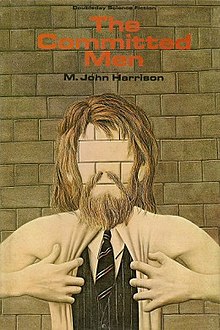By M. JOHN HARRISON (Doubleday; 1971)
The apocalypse-themed first novel by England’s enormously gifted M. John Harrison, who in more recent years has all-but disowned it. THE COMMITTED MEN has been out of print for some time and no longer appears in Harrison bibliographies, and while the man himself hasn’t exactly denounced it, he has bemoaned the “old hobby horses to be seen at the dog & pony show of the apocalypse, no new ones yet,” disaster fiction being “an empty genre.”
Harrison evidently felt differently in 1971. THE COMMITTED MEN is dedicated to Michael Moorcock (and his then-wife Hilary), a pivotal figure in the UK science fiction New Wave (as was Harrison), in which category this novel fits quite well. Its major influence is denoted by an early passage describing a collection of epherema containing “a photograph of J.G. Ballard,” one of the movement’s key voices (further evidence that Harrison is over this novel can be found in his 2023 memoir WISH I WAS HERE, containing a self-directed exhortation to “Observe instances from everywhere you look, not J.G. Ballard novels”).
The setting is a post-nuclear England in which skin cancer and physical mutations run rampant. Clement Wendover is a small-town doctor who after his wife leaves him gets involved in the transport of a scaly skinned infant to a tribe of similarly afflicted folk. Along for the ride are a ragtag group that includes a bow-legged former patient of Wendover named Harper, a dwarf known as Arm, and Morag, a pregnant (though not for long) woman who becomes a surrogate mother to the baby. The devastated world through which they make their way includes businessmen who lead “maggoty existences” in office buildings despite the fact that civilization has ended, a guerrilla military contingent, bands of roving anarchists and, most horrific of all, a deranged nun who presides over a congregation of cannibals.
Harrison’s compositional predilections are consistently elegant and refined. His was one of the most distinct voices to emerge from the 1960s sci-fi scene, and THE COMMITTED MEN indicates that distinction was evident very early on in his development. In fact, the novel’s major flaw in my eyes is that it’s a bit too refined for its own good, telling an extremely bleak, violent tale whose genteel veneer fails to do it justice.
In keeping with that veneer, the storytelling is quite languid, with chapters that conclude more often than not with odd non-sequiturs. There are no Dan Brown-ish last line cliffhangers to be found here, nor any gratuitous violence (you’ll have to read very closely to figure out precisely what’s happening in an early description of a miscarriage and a later one about cannibalism), just a gorgeously drafted piece of work that could have done with a grittier treatment.

